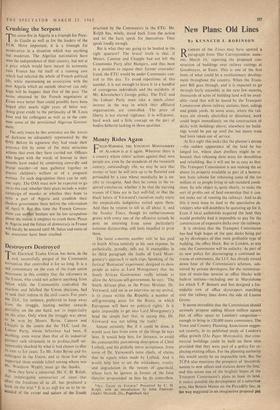Destroyers Destroyed
THE Electrical Trades Union has been, in the end, successfully purged of the Communist corruption that controlled it for so long. It is a sad commentary on the state of the trade union movement in this country that the reformers in the Union, who could not achieve anything from below while the Communists controlled the Machine and falsified the Union elections, had to seek their redress in the civil courts. For years the TUC, for instance, preferred to keep away from the struggle, leaning neither towards Partiality on the one hand, nor to impartiality on the other.. Only when the struggle was about to be won by Messrs. Byrne, Cannon and Chapple in the courts did the TUC (and the Labour Party, whose, behaviour had been, if anything, even worse than that of its industrial Partner) rush virtuously in to profess ,itself un- aPpeasably shocked by what it had chosen to shut its eyes to for years. To Mr. John Byrne and his colleagues in the Union, and to those few who supported them outside (chief among whom was Mr. Woodrow Wyatt), must go the thanks.
Now they have a memorial. Mr. C. H. Rolph. that indefatigable summariser of cases that affect the freedoms of us all, has produced a book on the trial.* It is as well for us to be re- minded of the extent and nature of the frauds practised by the Communists in the ETU. Mr. Rolph has, wisely, stood back from .the action and let the facts speak for themselves. They speak loudly enough.
But is what they say going to be heeded in the right quarters? The brutal truth is that, if Messrs. Cannon and Chapple had not left the Communist Party after Hungary, and thus been in a position to expose their former comrades' fraud, the ETU would be under Communist con- trol to this day. To avoid repetitions of this scandal, it is not enough to leave it to a handful of courageous individuals and the accidents of Mr. Khrushchev's foreign policy. The TUC and the Labour Party must take a much closer interest in the way in which their affiliated organisations are controlled. The price of liberty is not eternal vigilance; it is will-power, hard work and a little courage on the part of bodies hitherto lacking in those qualities.


































 Previous page
Previous page